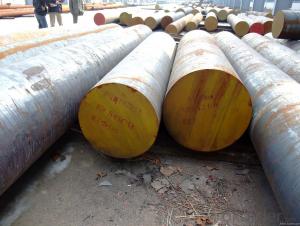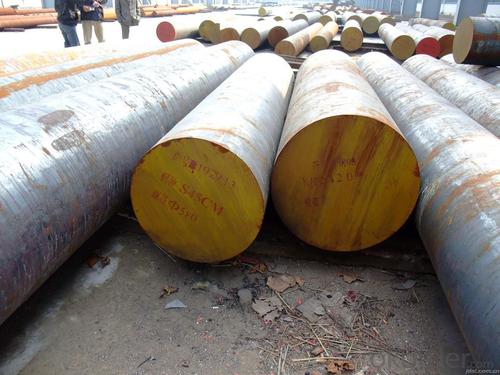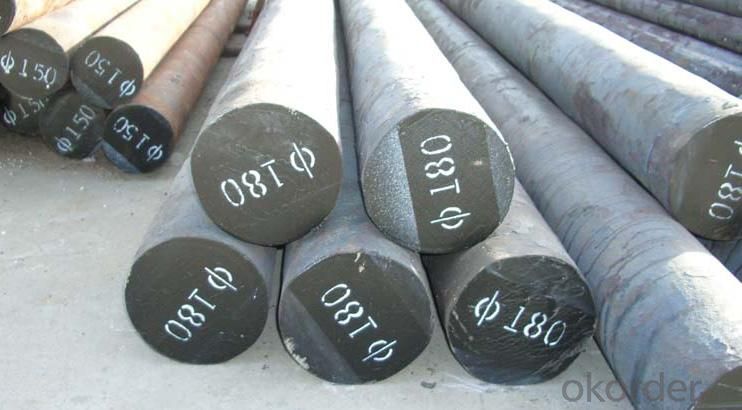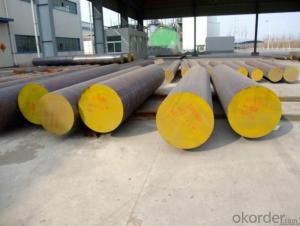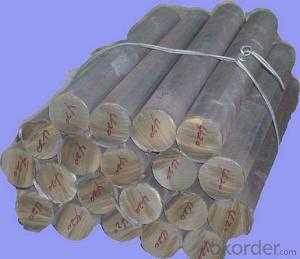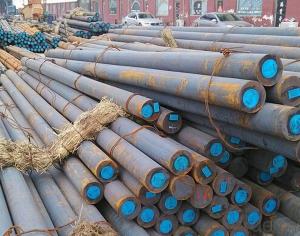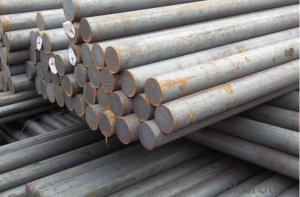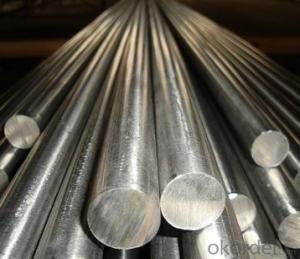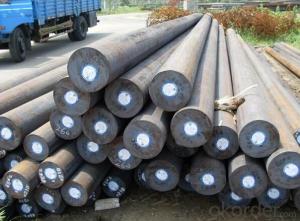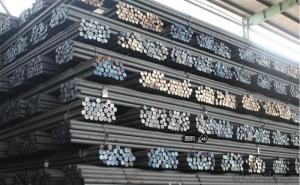Special Steel Forged Steel 709M40 Round Steel Bar
- Loading Port:
- China main port
- Payment Terms:
- TT OR LC
- Min Order Qty:
- 30 m.t.
- Supply Capability:
- 10000 m.t./month
OKorder Service Pledge
OKorder Financial Service
You Might Also Like
Specification
Product Information
1 Chemical Composition:
C | Si | Mn | P | S | Cr | Mo |
0.36-0.44 | 0.10-0.35 | 0.70-1.00 | ≤0.035 | ≤0.04 | 0.90-1.50 | 0.20-0.35 |
2 Brief Introduction:
Dimension | 13-350mm |
Length | 2-13m or as per your request |
Delivery condition | Hot rolled |
Heat Treatment | Normalizing, Annealing, Quenching |
Packing | Standard seaworthy packing or according to your requirements |
3 Mechanical Property:
Yield Strength (MPa) | ≥417.1 |
Tensile Strength (MPa) | ≥655.0 |
Elongation (%) | ≥25.7 |
Hardness (HB) | ≤197 |
Reduction in Area (%) | ≥56.9 |
AKV (J) | ≥54.5 |
Product Show
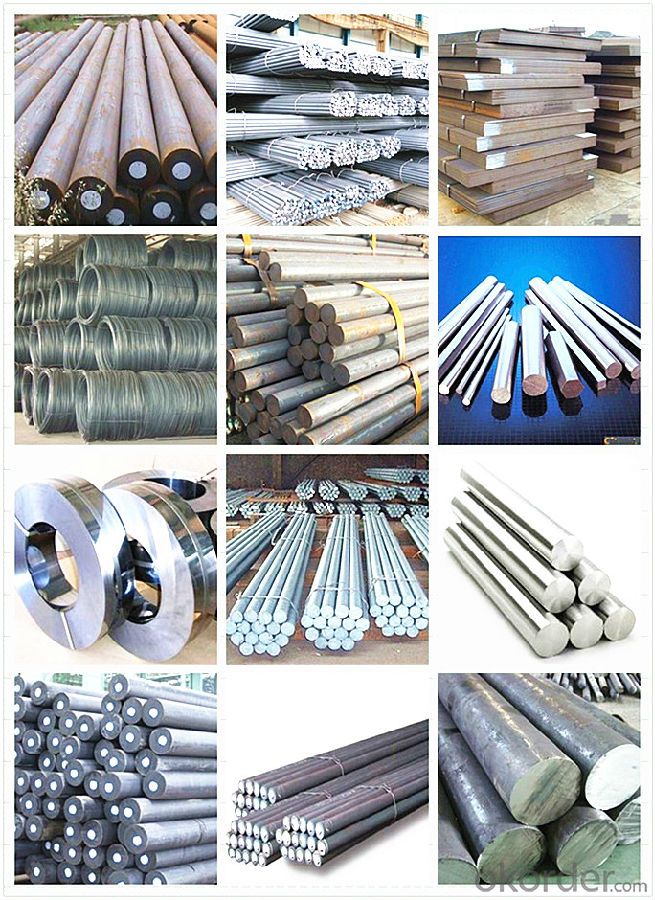
Workshop Show
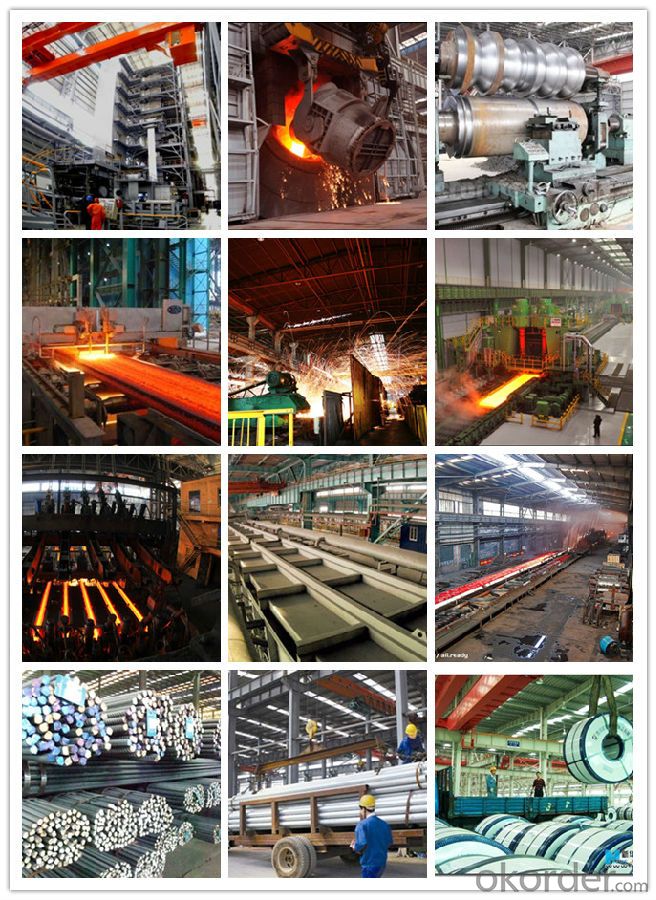
Shipping
1. FedEx/DHL/UPS/TNT for samples, Door-to-Door;
2. By Air or by Sea for batch goods, for FCL; Airport/ Port receiving;
3. Customers specifying freight forwarders or negotiable shipping methods!
Delivery Time: 3-7 days for samples; 5-25 days for batch goods.
Payment Terms
1.Payment: T/T, L/C, Western Union, MoneyGram,PayPal; 30% deposits; 70% balance before delivery.
2.MOQ: 1pcs
3.Warranty : 3 years
4.Package Informations: 1) EXPORT, In 20 feet (GW 25 ton) or 40 feet Container (GW 25 ton)
2)as customer's requirement
Why choose us?
(1) The leading exporter in China special steel industry.
(2) Large stocks for various sizes, fast delivery date.
(3) Good business relationship with China famous factories.
(4) More than 7 years steel exporting experience.
(5) Good after-sales service guarantee.
- Q: Is special steel resistant to wear and abrasion?
- Indeed, special steel is renowned for its exceptional resistance against wear and abrasion. Through the utilization of distinct alloying elements and heat treatment procedures, special steel is frequently crafted to elevate its hardness and toughness. These remarkable attributes confer upon it a remarkable immunity to the damaging consequences of wear and abrasion, rendering it ideal for endeavors necessitating longevity and durability. In various industries, including automotive, aerospace, construction, and manufacturing, special steels are frequently employed due to the harsh environments they encounter or the repetitive mechanical actions they endure, both of which can induce wear and abrasion.
- Q: How is high-strength alloy steel used in the production of structural components?
- High-strength alloy steel is used in the production of structural components due to its exceptional strength-to-weight ratio and durability. It provides enhanced load-bearing capabilities, allowing for the construction of lighter yet stronger structures. This steel is commonly utilized in manufacturing beams, columns, and other vital components of buildings, bridges, and infrastructure projects, ensuring the structural integrity and safety of these constructions.
- Q: How is duplex stainless steel used in the oil and gas industry?
- Duplex stainless steel is extensively used in the oil and gas industry due to its exceptional properties. It is commonly employed in the construction of pipelines, offshore platforms, and various equipment. Its high corrosion resistance allows for reliable performance in aggressive environments, such as offshore drilling rigs and subsea equipment. Additionally, its high strength and toughness make it suitable for handling high-pressure and high-temperature conditions. Overall, duplex stainless steel plays a crucial role in ensuring the safety, efficiency, and longevity of oil and gas operations.
- Q: What are the different surface hardening techniques used for special steel?
- Some of the different surface hardening techniques used for special steel include case hardening, nitriding, carburizing, and induction hardening.
- Q: What are the requirements for special steel used in power plants?
- The requirements for special steel used in power plants are specific and stringent, given the critical role that these materials play in ensuring the safe and efficient operation of power generation facilities. Some of the key requirements for special steel in power plants include: 1. High temperature resistance: Special steel used in power plants must be able to withstand high temperatures without losing its structural integrity. This is crucial as power plants operate at elevated temperatures, especially in areas such as the combustion chamber or steam turbines. 2. Corrosion resistance: Power plants often operate in environments with high levels of moisture, chemicals, and other corrosive elements. Special steel must possess excellent corrosion resistance to prevent degradation and premature failure caused by chemical reactions or rusting. 3. Strength and toughness: As power plants generate significant amounts of energy, the components made of special steel must exhibit high strength and toughness to withstand the mechanical stresses and loads they are subjected to. This includes resistance to fatigue, creep, and stress corrosion cracking. 4. Weldability: Power plant components often require welding during fabrication or maintenance. Special steel should have good weldability to ensure strong and reliable joints that maintain the structural integrity of the overall system. 5. Low thermal expansion: Special steel used in power plants should have low thermal expansion properties to minimize the risk of thermal stress and distortion that can occur due to temperature variations during operation. This ensures dimensional stability and prevents premature failure. 6. Resistance to radiation: In some power plants, such as nuclear facilities, special steel may be exposed to radiation. Therefore, it is necessary for the steel to have good resistance to radiation damage, ensuring its long-term performance and safety. 7. Compliance with industry standards: Special steel used in power plants must meet specific industry standards and codes to ensure its quality, reliability, and safety. These may include standards such as ASTM, ASME, or ISO, among others. Overall, the requirements for special steel used in power plants are driven by the need for high temperature resistance, corrosion resistance, strength, weldability, low thermal expansion, radiation resistance, and compliance with industry standards. Meeting these requirements ensures the integrity and longevity of power plant components, contributing to the safe and efficient generation of electricity.
- Q: What industries rely on special steel?
- Several industries heavily rely on special steel due to its unique properties and exceptional performance. One such industry is the automotive sector, where special steel is extensively used in the production of engine components, suspension systems, gears, and various other parts. The aerospace industry is another prominent user of special steel as it requires materials that can withstand high temperatures, extreme pressure, and provide excellent corrosion resistance. Special steel is also essential in the construction industry, particularly for the manufacturing of high-rise buildings, bridges, and infrastructure projects where strength, durability, and resistance to environmental factors are crucial. The energy sector, including oil and gas, relies on special steel for the production of pipelines, drilling equipment, and storage tanks, as it possesses excellent mechanical properties and can withstand harsh operating conditions. Other industries that heavily rely on special steel include manufacturing, machinery, defense, and tooling, where it is used for various applications such as molds, cutting tools, and machine components. Overall, special steel finds extensive usage in industries that demand superior performance, durability, and reliability in their products and equipment.
- Q: What are the specific requirements for special steel used in the defense sector?
- The specific requirements for special steel used in the defense sector vary depending on the specific applications and needs. However, some common requirements include high strength and toughness, corrosion resistance, heat resistance, and compatibility with various manufacturing processes. Additionally, special steel used in the defense sector may need to meet specific standards and certifications for quality control, such as MIL-SPEC or NATO specifications.
- Q: What are the applications of tool steel?
- Tool steel is widely used in various applications due to its exceptional hardness, wear resistance, and ability to retain sharp edges. It is commonly utilized in the manufacturing of cutting tools such as drills, saw blades, and milling cutters. Additionally, tool steel finds applications in the production of molds for plastic injection or die casting, as well as in the manufacturing of punches, dies, and shears used in metalworking processes. Its high strength and heat resistance also make it suitable for applications in the aerospace and automotive industries, where it is utilized in components like engine valves, gears, and shafts.
- Q: Can special steel be machined easily?
- No, special steel is typically harder and more difficult to machine compared to regular steel due to its higher alloy content and specific properties.
- Q: How long does special steel typically last in various applications?
- The lifespan of special steel in various applications can vary depending on several factors. Special steel is known for its exceptional strength, durability, and resistance to corrosion, making it suitable for a wide range of applications. However, the actual lifespan of special steel will depend on the specific application, maintenance practices, and environmental conditions it is exposed to. In general, special steel can last for several decades or even longer when used in industries such as construction, automotive, aerospace, and manufacturing. For instance, in building structures, special steel can last for 50 to 100 years, thanks to its robustness and ability to withstand extreme loads and weather conditions. In automotive applications, special steel components like engine parts, suspension systems, and body frames can have a lifespan of 15 to 30 years, given that they are properly maintained and not subjected to excessive wear and tear. When it comes to the aerospace industry, special steel is commonly used in critical components like turbine blades, landing gears, and fuselage structures. These parts undergo rigorous testing and inspection procedures and are designed to last for decades, typically around 30 to 50 years, before requiring replacement or refurbishment. In manufacturing processes, special steel tools and dies can have a lifespan ranging from a few years to several decades, depending on the intensity of use, the material being processed, and the maintenance practices employed. Proper lubrication, cooling, and regular maintenance can significantly extend the lifespan of these tools. It is important to note that the lifespan of special steel can be adversely affected by factors such as exposure to harsh chemicals, high temperatures, aggressive environments, or inadequate maintenance. Therefore, regular inspections, maintenance, and adherence to recommended usage guidelines are crucial in ensuring the longevity of special steel in various applications.
Send your message to us
Special Steel Forged Steel 709M40 Round Steel Bar
- Loading Port:
- China main port
- Payment Terms:
- TT OR LC
- Min Order Qty:
- 30 m.t.
- Supply Capability:
- 10000 m.t./month
OKorder Service Pledge
OKorder Financial Service
Similar products
Hot products
Hot Searches
Related keywords
